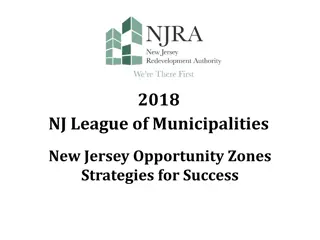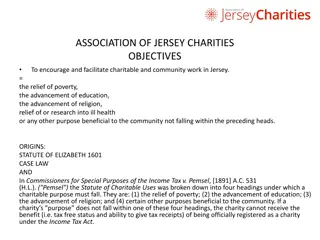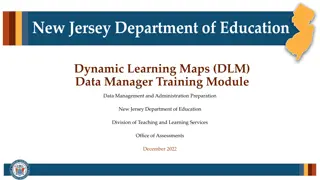Overview of University Definitions and Status in New Jersey
Definitions of a university, the process for attaining comprehensive university status in New Jersey, and a list of six research universities in the state are discussed. The criteria for university recognition, historical context, and differences between comprehensive and research universities are highlighted.
Download Presentation

Please find below an Image/Link to download the presentation.
The content on the website is provided AS IS for your information and personal use only. It may not be sold, licensed, or shared on other websites without obtaining consent from the author. Download presentation by click this link. If you encounter any issues during the download, it is possible that the publisher has removed the file from their server.
E N D
Presentation Transcript
The Faculty Senate Task Force on University Status 2012-2013 Points of Information
Definitions of University : an institution of higher learning providing facilities for teaching and research and authorized to grant academic degrees; specifically: one made up of an undergraduate division which confers bachelor's degrees and a graduate division which comprises a graduate school and professional schools each of which may confer master's degrees and doctorates (Merriam-Webster) Institution of higher education, usually comprising a liberal arts and sciences college and graduate and professional schools that confer degrees in various fields. A university differs from a college in that it is usually larger, has a broader curriculum, and offers advanced degrees in addition to undergraduate degrees. The first true university was the University of Bologna, founded in the 11th century; the first in northern Europe was the University of Paris, which served as a model for the universities of Oxford, Cambridge, Heidelberg, and others. One of the first modern universities, in which secular objectivity and rationalism replaced religious orthodoxy, was the University of Halle (founded 1694 in Halle, Ger.). The liberalism of Halle was adopted by G ttingen, Berlin, and many other German universities. The German model of the university as a complex of schools and research institutes also exerted a worldwide influence. The growth of universities in the U.S., where most colleges had been established by religious denominations, was greatly spurred by the Morrill Act of 1862. (Concise Encyclopedia)
New Jersey Definition & Process In New Jersey, an institution that offers graduate and undergraduate degrees in a variety of academic disciplines and professional fields may seek status as a comprehensive university. Such institutions emphasize teaching, and are distinct from the state's six research universities (see next slide), which place a heavier emphasis on basic and applied research and Ph.D. programs. Being granted university status recognizes the level and diversity of programs that the institution already offers, and does not authorize the addition of doctoral programs or other new degrees. From 1993, when the process for recognition as a comprehensive university was implemented, through 1998, six institutions had completed the designation: Montclair State, Rider, Monmouth, Rowan, William Paterson and Kean universities. Georgian Court and Jersey City completed the process subsequently; St. Peters did as recently as 2012. To qualify for university status, an institution must meet national standards for inclusion as a master's college or university in the Carnegie Classification of Institutions of Higher Education and demonstrate that it has met New Jersey eligibility criteria (granting masters degrees) for at least five years.
Six New Jersey Research Universities Private Public New Jersey Institute of Technology (NJIT) Rutgers University University of Medicine and Dentistry (UMDNJ) Princeton University Seton Hall University Stevens Institute of Technology Source: New Jersey Department of Higher Education List of Schools by Sector: http://www.nj.gov/highereducation/colleges/schools_sector.htm Note: Carnegie Basic Classifications are all Research or Doctoral
Eleven New Jersey Comprehensive Universities Private Drew University* Fairleigh Dickinson University Georgian Court University Monmouth University Rider University Saint Peter s University Public Kean University Montclair State University New Jersey City University Rowan University William Paterson University Source: http://www.nj.gov/highereducation/colleges/schools_sector.htm Note: Carnegie Basic Classifications are all Masters Colleges and Universities except Drew, which remains listed as a Baccalaureate College by Carnegie
Nine New Jersey Colleges Private Bloomfield College Caldwell College Centenary College Felician College College of St. Elizabeth Public The College of New Jersey Ramapo College Richard Stockton College Thomas Edison State College Source: http://www.nj.gov/highereducation/colleges/schools_sector.htm Note: Carnegie Basic Classifications are all Masters Colleges and Universities except Bloomfield, Felician and Thomas Edison, all of which are listed as Baccalaureate Colleges by Carnegie
Visit the Office of the President Key Dates and Current Stockton Graduate Program Enrollments 1997 NJ Commission granted permission for masters programs (Masters in Physical Therapy) 2006 NJ Commission granted permission for one doctoral program (Doctor of Physical Therapy)
In Summary Research (Doctoral) Universities differ from Comprehensive (Masters) Universities Renaming does not alter Carnegie Status New Jersey allows colleges to change status and rename based on two criteria: 1. Five+ years of granting masters degrees and 2. Carnegie classification of Masters College/University Stockton has met both criteria for comprehensive (teaching) university status since 2010























